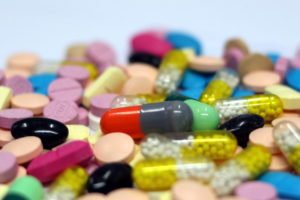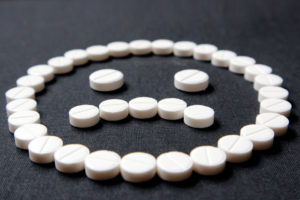What's On This Page?
ToggleYou don’t think about an interaction with your vitamins, supplement or herbals, do you? I bet you only think about an interaction if you take medication. That’s the topic of this article.
We are better off getting our nutrients from healthy foods and beverages, but dietary supplements can fill a nutritional gap. It’s confusing to know when you should take certain nutrients, especially the minerals which can bind or “chelate” with a lot of different medications. It’s also difficult to time your supplements around meals and medications. Over the years, I’ve used my own vitamin list to help me remember when and how to take supplements.
I think it could help you, especially if you have to take a lot of different things. You can download my form for free at my website and fill in the blanks with your own supplements. This cheat sheet will help you stay on track. As a pharmacist, it’s kind of in my blood to ‘approach with caution’ and I don’t necessarily mean pharmaceuticals.
Some Supplements Act Like a Drug
 Supplements (the high quality ones that really work) will act in your body exactly like a drug and the timing impacts efficacy. Before you embark on any supplement regimen, I suggest you ask a holistic-minded practitioner what is right for you with consideration to your allergies, your liver, kidney function and even genetic mutations.
Supplements (the high quality ones that really work) will act in your body exactly like a drug and the timing impacts efficacy. Before you embark on any supplement regimen, I suggest you ask a holistic-minded practitioner what is right for you with consideration to your allergies, your liver, kidney function and even genetic mutations.
By learning all you can about vitamins and minerals you can make better choices about dosages. There are times when I need to dump out 50 percent of one capsule to get a lower dose, and other times I will take more than what is typically recommended. We are all very unique.
Today I will teach you more about timing your medications and supplements so you can optimize effect and minimize risk.
Taking some medicines too late in the day will make you wide-eyed at 3am! Same for coffee and oh yes, one of my favorite brain stimulants, Yerba Mate tea. Reminds me when I drank that not too long ago. I was wide-eyed at 3am so after tweeting you, I posted something on Instagram (I should not be allowed to post after midnight) but anyway, I then went on YouTube bleary-eyed to watch Maru my favorite cat, followed by the lip sync battle with Jimmy Fallon and somebody!
While epic, I would have preferred to be asleep. (I should go ahead an confess I crawled downstairs to wipe out left-over sushi, not an unusual thing… those rolls don’t stand a chance if I so much as roll over and think of them before the sun rises).
Interactions with minerals can defeat the purpose of taking medications. The most famous one is taking calcium or iron, or other minerals with tetracycline-derived antibiotics. Taking B vitamins (folate) with epileptic drugs can be dangerous because you negate the effect of the medicine.
Since there are thousands of medications and supplements, it’s impossible to cover them all, however I will now elaborate on the big categories. I’ve also created a “Vitamin List” which you can adapt and use for your own regimen. At the end of this article, you will see 2 media files you can click on, one is a Sample (an example of what it looks like when filled out), and the other says “Your Vitamin List” and that is the one you can print and use for yourself.
You will see the links for these towards the bottom, in the meantime I want you to learn a little more about supplements and medicines, and WHEN to take them.
 Medicines and supplements that are best taken in the MORNING:
Medicines and supplements that are best taken in the MORNING:
Thyroid medication
Modafinil (Provigil)
Stimulants (Ritalin, Concerta, Adderal)
Diuretics like HCTZ, furosemide, dandelion, berberine, neem, green tea and others
Osteoporosis drugs (Boniva, Fosamax, etc)
Curcumin can be taken anytime, however, since it raises brain neurotransmitters like dopamine and serotonin, I suggest it as a morning supplement.
Riboflavin supports adrenal, I think it’s ideally taken in the morning or lunch.
Medicines and supplements that are best taken WITH food
Mineral supplements (iodine, magnesium, calcium, iron)
Vitamin A, D, E or K (fat-soluble vitamins) best with fatty foods
Anti-fungals like ketoconazole, itraconazole, nystatin
CoQ10
Probiotics, it’s just easier than trying to take them on an empty stomach (results are the same)
ThyroScript thyroid formula
Herbal supplements (generally speaking) these should be taken with food.
Medicines and supplements that are best taken at NIGHT:
Diphenhydramine
Aspirin
Magnesium
Ashwagandha (may cause drowsiness) –> this is in my Thyroid Script® supplement
Goto kola (not a hard-fast rule, I’ve heard reports of this actually causing insomnia)
Skullcap
Muscle relaxers
Statin cholesterol reducers (atorvastatin, lovastatin, pravastatin, etc)
ACE inhibitors (like enalapril, fosinopril, captopril, lisinopril)
ARB class of blood pressure pills (candesartan, etc)
Interaction Alert – DO NOT COMBINE
- 5-HTP with any antidepressant that raises serotonin (it may cause serotonin syndrome)
- Antacids that contain “magnesium” or magnesium supplements should not be taken with glipizide and glyburide, as it enhances the effect of blood-sugar lowering drugs and may reduce blood sugar too fast. (Really, this interaction could occur with any blood-sugar lowering agent).
- Chocolate with Nardil (phenelzine)
- Folate with methotrexate or phenytoin
- Grapefruit or pomegranate foods/supplements with statins (READ MY OTHER ARTICLE ON THIS)
- HCTZ with vitamin D (raises calcium too much)
- Licorice extract with digoxin or HCTZ
- Magnesium with Neurontin (Gabapentin). The drug binds magnesium in the gut (maybe useful to reduce HIGH magnesium levels, but not good if you’re trying to maintain magnesium levels). Separate administration.
- Magnesium with minocycline or doxycycline (any tetracycline). It chelates.
- Minerals or dairy foods with minocycline or doxycycline
- St John’s wort with any antidepressant (same reason as 5-HTP above)
- Tyrosine with L-dopa drugs (Levodopa, Sinemet, etc) due to enhanced dopamine production
- Vitamin K or ginkgo with anticoagulants
Focus: MAO Inhibitors and Chocolate
I realize chocolate is sort of like a major food group, however, I want you to really be aware it can be dangerous with MAO [monoamine oxidase] inhibitors that’s why it appears above in my list. If you must have your chocolate, please ask doc to change your medication because the interaction is real!
^*^ Right after this article printed in the Sun-Sentinel, Florida, I received an email from Mr. Michael D. Schadler, the Director of The Florida Department of Citrus:
Hi Suzy,
We know of no validated evidence that coadministration of grapefruit or its juice with a drug has caused a drug interaction resulting in actual harm to a patient’s health. Two extensive review articles have appeared in the peer-reviewed medical literature on the topic of drug interactions with grapefruit, authored by Dr. Mertens-Talcott [1] and associates of the University of Florida, and by Dr. Hanley [2] and associates of Tufts University.
These articles provide a review of primary research literature, a compilation of the extent of interactions with specific drugs, and an evaluation of their clinical importance.
Additionally, the cholesterol-lowering statin drugs:
Pravachol (pravastatin)
Lescol (fluvastatin)
Crestor (rosuvastatin) are considered to be safe to consume with grapefruit and its juice.
Similarly, the blood pressure medications:
Norvasc (amlodipine)
Calan/Isoptin (Verapamil)
Cardizem (diltiazem) are considered to be safe to consume with grapefruit and its juice.
While this may sound like a fine point, it affects millions of people taking heart medications.
The FDOC is committed to educating patients and health professionals on the facts about grapefruit-drug interactions by working with leading experts on the subject, including Hartmut Derendorf, Ph.D., past-president of the American College of Clinical Pharmacology and a distinguished professor at the University of Florida.
He has published an article in the Journal of Clinical Pharmacology addressing this issue. Below are important points from Dr. Derendorf’s research to consider if you comment on this complicated topic in the future:
· While some prescription medications may interact with grapefruit juice, most do not.
· For patients who are prescribed a medication that may interact with grapefruit juice and wish to continue consuming this healthy beverage, their physicians often can prescribe non-interacting, alternative medications within the most commonly prescribed drug classes. These medications often can provide the same therapeutic effect with no need to avoid grapefruit juice.
· It is safe to consume grapefruit juice while taking virtually all over-the-counter medications.
Patients should consult their physician or pharmacist if they have any questions about their prescription medication(s). After all, food and drug interactions, when they do occur, can vary by individual and prescription type. Our hope is to help clear up confusion around this issue and set the record straight that grapefruit juice can be safely co-ingested with the great majority of medications.
[1] Mertens-Talcott SU, Zadezensky I, De Castro WV, Derendorf H and Butterweck V. Grapefruit-drug interactions: can interactions with drugs be avoided? J Clin Pharmacol 2006;46:1390-1416.
[2] Hanley MJ, Cancalon P, Widmer WW and Greenblatt DJ. The effect of grapefruit juice on drug disposition. Expert Opin Drug Metab Toxicol 2011;7:267-286.
Click Here to read my article on How Drug Muggers Can Steal The Life Out Of You

Suzy Cohen, has been a licensed pharmacist for over 30 years and believes the best approach to chronic illness is a combination of natural medicine and conventional. She founded her own dietary supplement company specializing in custom-formulas, some of which have patents. With a special focus on functional medicine, thyroid health and drug nutrient depletion, Suzy is the author of several related books including Thyroid Healthy, Drug Muggers, Diabetes Without Drugs, and a nationally syndicated column.

